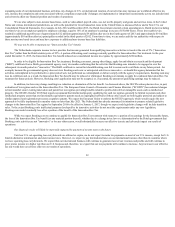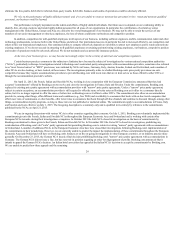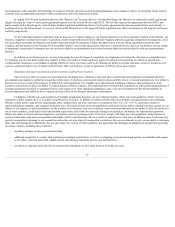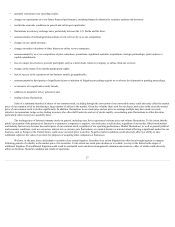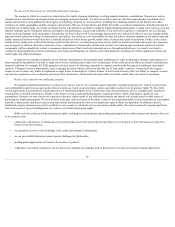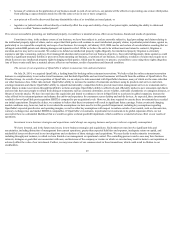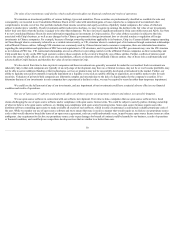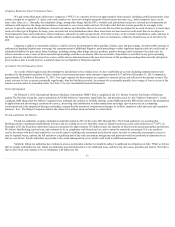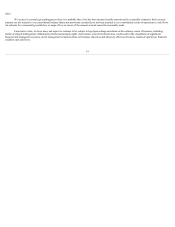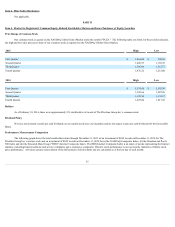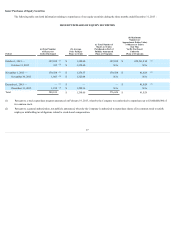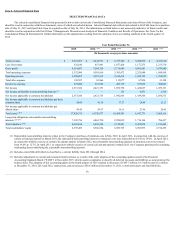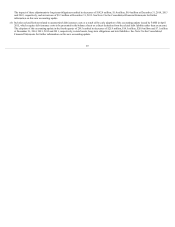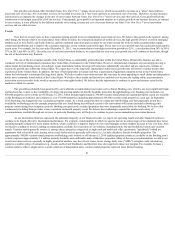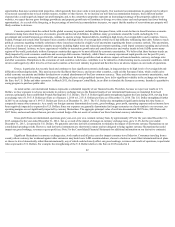Priceline 2015 Annual Report Download - page 35
Download and view the complete annual report
Please find page 35 of the 2015 Priceline annual report below. You can navigate through the pages in the report by either clicking on the pages listed below, or by using the keyword search tool below to find specific information within the annual report.
Item 3. Legal Proceedings
Competition Reviews
Certain business practices common to the online travel industry have become the subject of investigations by various national competition authorities
("NCAs"), particularly in Europe. Investigations related to Booking.com's contractual parity arrangements with accommodation providers, sometimes also referred
to as "most favored nation" or "MFN" provisions, were initiated by NCAs in France, Germany, Italy, Austria, Sweden, Ireland and Switzerland, and a number of
other NCAs are also looking, or have looked, at these issues. The investigations primarily relate to whether Booking.com's price parity provisions are anti-
competitive because they require accommodation providers to provide Booking.com with room rates that are at least as low as those offered to other online travel
companies ("OTCs") or through the accommodation provider's website.
On April 21, 2015, the French, Italian and Swedish NCAs, working in close cooperation with the European Commission, announced that they had
accepted "commitments" offered by Booking.com to resolve and close the investigations in France, Italy and Sweden. Under the commitments, Booking.com
replaced its existing price parity agreements with accommodation providers with "narrow" price parity agreements. Under a "narrow" price parity agreement,
subject to certain exceptions, an accommodation provider is still required to offer the same or better rates on Booking.com as it offers to a consumer directly
online, but it is no longer required to offer the same or better rates on Booking.com as it offers to other OTCs. The commitments also allow an accommodation
provider to, among other things, offer different terms and conditions (e.g., free WiFi) and availability to consumers that book with on-line travel companies that
offer lower rates of commission or other benefits, offer lower rates to consumers that book through off-line channels and continue to discount through, among other
things, accommodation loyalty programs, as long as those rates are not published or marketed online. The commitments apply to accommodations in France, Italy
and Sweden and were effective on July 1, 2015. The foregoing description is a summary only and is qualified in its entirety by reference to the commitments
published by the NCAs on April 21, 2015.
We are in ongoing discussions with various NCAs in other countries regarding their concerns. On July 1, 2015, Booking.com voluntarily implemented the
commitments given to the French, Italian and Swedish NCAs throughout the European Economic Area and Switzerland and is working with certain other
European NCAs towards closing their investigations or inquiries. In October 2015, the Irish NCA closed its investigation on the basis of commitments by
Booking.com identical to those given to the French, Italian and Swedish NCAs. In November 2015, the Swiss NCA closed its investigation, prohibiting any
reintroduction of Booking.com's old "wide" parity agreements but permitting Booking.com to retain its existing "narrow" parity agreements with accommodations
in Switzerland. A number of additional NCAs in the European Economic Area have now closed their investigations following Booking.com's implementation of
the commitments in their jurisdictions. However, we are currently unable to predict the impact the implementation of these commitments throughout the European
Economic Area and Switzerland will have on Booking.com's business or on the on-going investigations in other European countries, or on industry practice more
generally. On December 23, 2015, the German NCA issued a final decision prohibiting Booking.com's "narrow" price parity agreements with accommodations in
Germany. The German NCA did not issue a fine, but has reserved its position regarding an order for disgorgement of profits. Booking.com intends to appeal the
German NCA's decision. An Italian hotel association has appealed the Italian NCA's decision to accept the commitments by Booking.com. We are unable to
predict how these appeals and the remaining investigations in other countries will ultimately be resolved. Possible outcomes include requiring Booking.com to
amend or remove its rate parity clause from its contracts with accommodation providers in those jurisdictions and/or the imposition of fines.
In August 2015, French legislation known as the "Macron Law" became effective. Among other things, the Macron Law makes price parity agreements
illegal, including the "narrow" price parity agreements agreed to by the French NCA in April 2015. The law also requires that agreements between OTCs and
hotels comply with a French agency contract form. Similar legislation prohibiting "narrow" price parity agreements has been proposed in Italy and currently is
awaiting action by the Italian Senate. It is not yet clear whether the Macron Law or the proposed Italian legislation may affect our business in the long term in
France and Italy, respectively.
32


